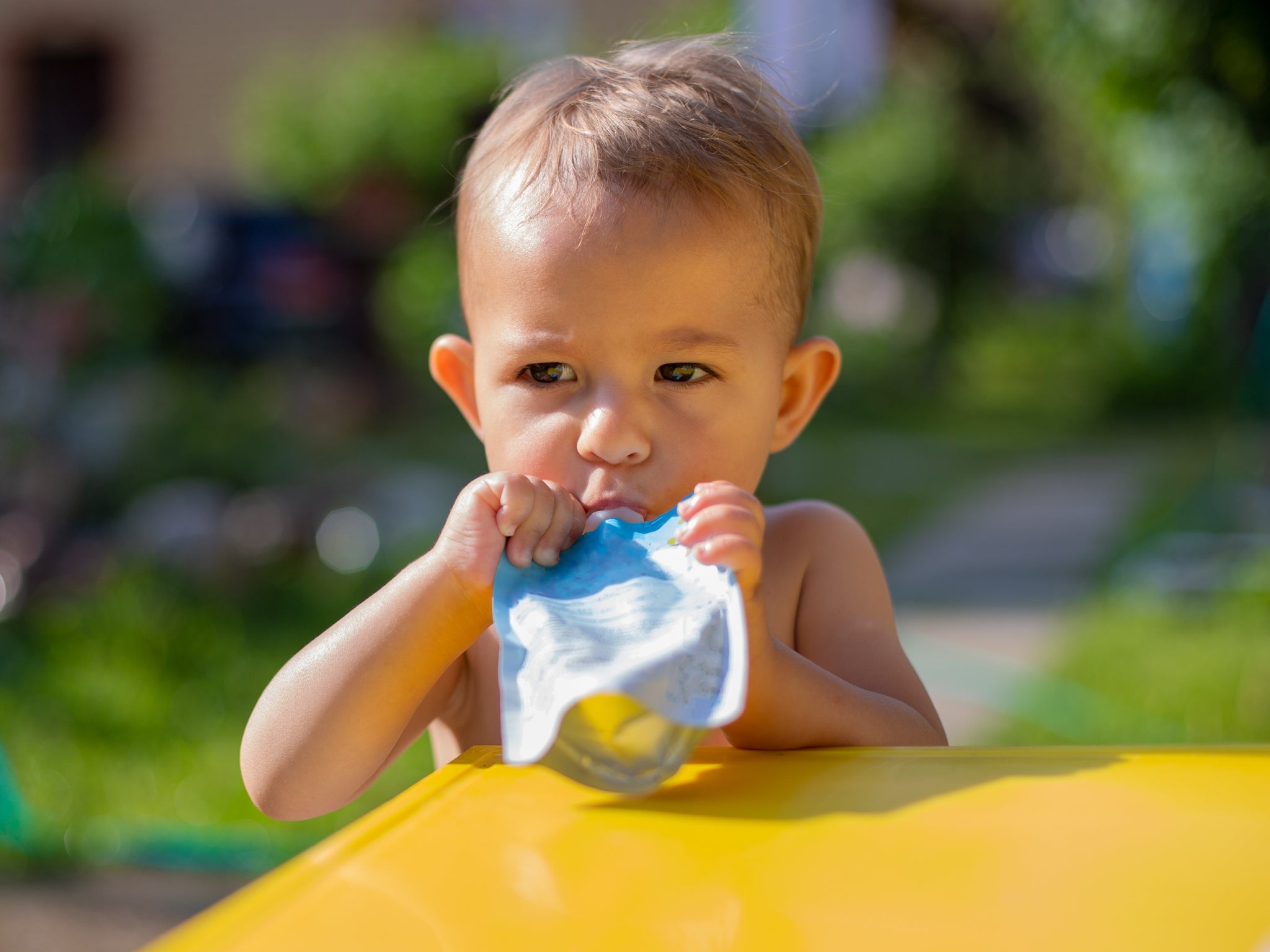‘Healthy’ baby food can contain up to two teaspoons of unnecessary sugar, study claims
Experts are calling out ‘misleading’ sugar claims on packaging

Baby and toddler food that says it’s “healthy” can contain as much as two teaspoons of unnecessary sugar, despite being sold as weaning food, a study has found.
Charity, Action on Sugar, analysed 73 sweet snacks designed for babies and toddlers and found that, while all featured “healthy sounding” claims on the packaging, 37 per cent of the snacks could receive a red traffic light-style label for their sugar content.
Only six products - or eight per cent of the snacks analysed - would have received a green label indicating low sugar.
Currently, baby and children’s food and drink is not required to display front of pack traffic light labelling.
The charity said one of the worst offenders was Heinz Farley’s Mini Rusks Original, which contained 8.7g of sugars per serving or the equivalent of two teaspoons of sugar. This was followed by Organix Banana Soft Oaty Bars, which are sweetened with apple juice concentrate and contained 8.1g of sugars per serving.
Heinz said in a statement: “Sugar reduction is a key focus for Heinz for Baby and we are looking into ways to improve the products we make. Alongside the original rusks Farley’s offer a range of reduced sugar rusks with 30 per cent less sugar.
“The level of added sugars in these recipes is kept to a minimum consistent with the need to provide a texture which dissolves easily to avoid the risk of choking. Farley’s Rusks are very different from typical biscuits, containing very little fat and no added salt.”
Five Kiddylicious products were also noted as being high in sugar: Banana Crispy Tiddlers at 59g of sugar per 100g and Pineapple, Coconut and Mango Juicy Fruit Bars made up of 30.7g of sugar per 100g.
A poll from Action for Sugar found 84 per cent of parents of young children said they buy sweet snacks for their kids, while 60 per cent said a “no added sugar” claim would help influence their purchase.
Additionally, 92 per cent said they were more inclined to buy products containing “natural sources” of sugars such as fruit.
Dr Kawther Hashem, campaign lead at Action on Sugar and Research Fellow at Queen Mary University of London, said: “It’s ludicrous that certain food companies are being allowed to promote their high sugar sweet snacks to parents with very young children, despite them being aware that babies and toddlers shouldn’t be having any free sugars.
“Babies can have a preference for sweet foods, due to milk being ever so slightly sweet, but liking sugary foods is something they only learn by eating sugary foods.
“Some companies choose to encourage this preference further by providing lots of very sweet products from an early age. What we need is companies to make products with minimal amount of sugars, so young children can grow up enjoying less sweet foods.”
Action on Sugar has called for the removal of “misleading” nutrition and health claims, especially around “no added sugar” as this can often mean sugar is replaced with fruit concentrate which can be high in sugar.
It is also urging the Government to publish its composition guidelines for baby and toddler products, which will guide manufacturers on how much sugar should be used.
Graham MacGregor, Professor of Cardiovascular Medicine at Queen Mary University of London and chairman of Action on Sugar, said: “Consuming too much sugar on a regular basis means we’re eating too many calories. If we don’t use those calories as fuel, our body will store them as fat.
“This can lead to weight gain, and if this happens to our children, it’s likely they will carry the weight into their adolescent and adult years, potentially leading to overweight or obesity, as well as suffering from agonising tooth decay.
“It is therefore imperative that food companies act more responsibly and commit to reformulate sugar, salt and calorie reduction instead of foisting unhealthy products with misleading nutrition claims upon well-meaning parents.”
Emily Day, Head of Food Development at Organix said: “The majority of the sugar content within Organix Soft Oaty Bars comes from dried fruit which contains naturally occurring sugars, rather than the fruit juice concentrate which is used to hold all the ingredients together and to give a suitable texture for a child.
“Organix believes in using natural ingredients such as dried fruit which has the nutritional benefits of fibre, vitamins and minerals rather than using artificial sweeteners or table sugar. Fruit juice concentrate can also be used to provide flavour, and we clearly label the front of our packs to be transparent to parents. This is part of our No Junk Promise. As a brand we are constantly looking at natural ways to reduce sugar and are excited to share new news on this in 2022.”
The Independent has contacted Kiddylicious for comment.
Join our commenting forum
Join thought-provoking conversations, follow other Independent readers and see their replies
Comments
Bookmark popover
Removed from bookmarks